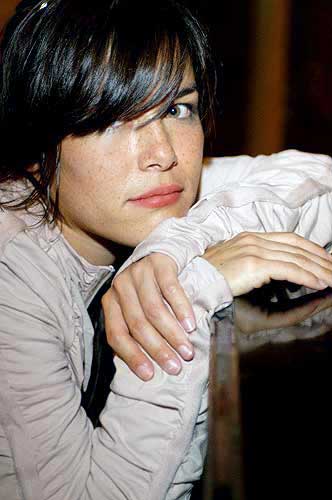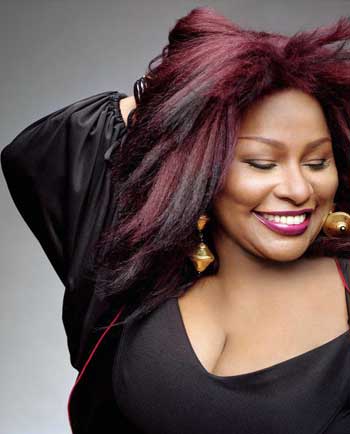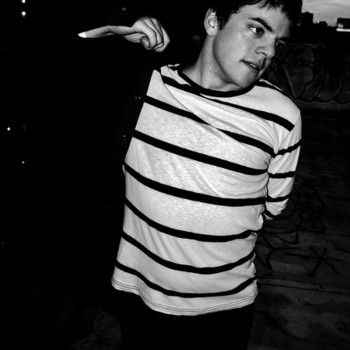Blind Boys of Alabama at the Kennedy Center
By Stephen Brookes • The Washington Post • September 29, 2008
It was a relief, frankly, to get away from the biting and clawing of the campaign season and head down to the Kennedy Center on Sunday night, where two of the country's most venerated groups -- the Preservation Hall Jazz Band and the Blind Boys of Alabama -- put on an evening of upbeat, optimistic and quintessentially American music.
 "You don't have to sit there and be polite," laughed trumpeter Mark Braud as the Preservation Hall players took the stage, and the packed concert hall clapped along through most of the classic, get-up-and-boogie New Orleans jazz that followed. Braud himself turned in a virtuosic performance -- his playful, free-form solo in "Sugar Blues" was a knockout -- while Charlie Gabriel took some sly and serpentine turns on the clarinet, and Clint Maedgen used his light tenor voice to channel jazz-era crooners in "Complicated Life" and the 1941 Ink Spots hit, "I Don't Want to Set the World on Fire." But things really got interesting when Walter Payton took a break from the bass and shimmied his substantial self through a baritone version of "Sister Kate" -- one of the most memorable performances of that song, ever.
"You don't have to sit there and be polite," laughed trumpeter Mark Braud as the Preservation Hall players took the stage, and the packed concert hall clapped along through most of the classic, get-up-and-boogie New Orleans jazz that followed. Braud himself turned in a virtuosic performance -- his playful, free-form solo in "Sugar Blues" was a knockout -- while Charlie Gabriel took some sly and serpentine turns on the clarinet, and Clint Maedgen used his light tenor voice to channel jazz-era crooners in "Complicated Life" and the 1941 Ink Spots hit, "I Don't Want to Set the World on Fire." But things really got interesting when Walter Payton took a break from the bass and shimmied his substantial self through a baritone version of "Sister Kate" -- one of the most memorable performances of that song, ever.
The star singers of the evening, of course, were the redoubtable Blind Boys of Alabama. "We are going to make a joyful noise tonight," promised lead vocalist Jimmy Carter, as the Boys, decked out in zoot-suit-y outfits in Cheez Curl orange, launched into an hour of soul-stirring gospel. From the classic "People Get Ready" to the funkier "Free at Last," they sang with all the passionate joy that has won them multiple Grammys over the years. And as if that weren't enough, they teamed up with the Preservation Hall players for "I'll Fly Away," "Uncloudy Day" and the timeless "Down by the Riverside" -- high-energy performances that had the audience on its feet to the very end.
Rachael Yamagata at the Birchmere
By Stephen Brookes • The Washington Post • September 25, 2008
 Statia MolewskiThe Birchmere stage was strewn with silk rose petals for Rachael Yamagata on Tuesday night -- bought by herself, the singer confessed, from an online wedding-supply store. It was quintessential Yamagata: wry, self-mocking and yet romantic to the core. The Arlington native has made a specialty of exploring the landscapes of the broken heart ever since her debut 2004 disc, "Happenstance," but as she showed the packed house, she doesn't just lay the emotion on thick -- she finesses it with imagination, tension and intriguing subtlety.
Statia MolewskiThe Birchmere stage was strewn with silk rose petals for Rachael Yamagata on Tuesday night -- bought by herself, the singer confessed, from an online wedding-supply store. It was quintessential Yamagata: wry, self-mocking and yet romantic to the core. The Arlington native has made a specialty of exploring the landscapes of the broken heart ever since her debut 2004 disc, "Happenstance," but as she showed the packed house, she doesn't just lay the emotion on thick -- she finesses it with imagination, tension and intriguing subtlety.
Yamagata has one of those carelessly beautiful, half-asleep voices that are made for brooding, and brooding to; it's husky and dark, like smoke from a smoldering fire. And while there's a little self-involvement in her songs -- okay, there's a lot of self-involvement in her songs -- there's also an easy naturalness to her singing that keeps everything from dissolving into angst soup. Alternating moody heart-tuggers (the early "Meet Me by the Water," the obsessive "Worn Me Down") with gutsier, more cathartic rock tunes ("What if I Leave," "Faster"), she kept the energy tight, and the emotions electric, throughout the set.
At 31 (she celebrated her birthday onstage, complete with cake), Yamagata may be getting ready to move in new directions; it's hard to mine the pain of love forever, and eventually you just get married and that's that. But the material she played from her upcoming release, "Elephants . . . Teeth Sinking Into Heart," showed that Yamagata is carving out a place as one of America's most interesting -- and maybe incurable -- romantics.
Mos Def at the Kennedy Center
By Stephen Brookes • The Washington Post • September 23, 2008
 If there's one thing Mos Def has, it's ambition. The hip-hop superstar -- who's also an actor, musician and (like all good Renaissance men) a budding clothing designer -- has been trying to invigorate hip-hop by pushing out the boundaries into jazz, R&B and soul. Is it working? The results were mixed Sunday night, when the artist brought his still-under-construction big band, the Amino Alkaline Orchestra, to the Kennedy Center Concert Hall for a show that was provocative and intense -- but often frustrating.
If there's one thing Mos Def has, it's ambition. The hip-hop superstar -- who's also an actor, musician and (like all good Renaissance men) a budding clothing designer -- has been trying to invigorate hip-hop by pushing out the boundaries into jazz, R&B and soul. Is it working? The results were mixed Sunday night, when the artist brought his still-under-construction big band, the Amino Alkaline Orchestra, to the Kennedy Center Concert Hall for a show that was provocative and intense -- but often frustrating.
There were some great moments, and Mos Def was in fine form all night, rapping intensely and roaming the stage with the loose, low-key charisma that's become his trademark. But the focus was always on the lyrics and the star, rather than the music; the orchestra was kept in the background, trudging through simple arrangements that didn't break much new ground. And with the exception of trumpeter Keyon Harrold, who delivered some gorgeous riffs in "All Caps," none of the players was given a solo. Too bad. Hip-hop needs to have its range expanded, and a hip-hop big band could be an amazing thing to hear. But if the musicians are straitjacketed, the music probably won't get very far.
Thereminists for Obama
 Finally! A button that thereminists can wear with pride. They're only a buck -- get yours here. (Via BoingBoing.)
Finally! A button that thereminists can wear with pride. They're only a buck -- get yours here. (Via BoingBoing.)
Double Divas
By Stephen Brookes • The Washington Post • September 6, 2008
 Chaka KhanAARP is pulling out the stops for its gargantuan 50th anniversary celebration this week, bringing a slew of big-name (and over-50) performers to the Washington Convention Center. Things got off to a spectacular start Thursday night, when singers Chaka Khan and Natalie Cole put on powerful -- if very different -- back-to-back sets before a crowd of thousands.
Chaka KhanAARP is pulling out the stops for its gargantuan 50th anniversary celebration this week, bringing a slew of big-name (and over-50) performers to the Washington Convention Center. Things got off to a spectacular start Thursday night, when singers Chaka Khan and Natalie Cole put on powerful -- if very different -- back-to-back sets before a crowd of thousands.
The impossible-to-pigeonhole Khan opened the evening with an hour-long set that jumped from rhythm and blues to disco to funk, tearing into her 1984 hit "I Feel for You" and delivering Rufus-era blockbusters from "Do You Love What You Feel" to the iconic "Tell Me Something Good." Khan's voice is still a thing of ferocious power, and at 55 she's hardly over the hill. But in spite of a flashy, gazillion-watt light show that could easily stun a small country, she turned in a rather tepid set. As if on autopilot, she never put her spectacular pipes to full use, and only really connected with the audience with a closing, heartfelt version of "I'm Every Woman."
Cole, who on Tuesday is releasing more American standards on "Still Unforgettable," was a different story entirely. Backed by a small orchestra, Cole sang elegant, eloquent classics, including "Come Rain or Come Shine" and "All the Things You Are," as well as lesser-known gems like Carmen McRae's "Coffee Time." Sophisticated but warm and unpretentious, Cole, 58, had the huge crowd with her from first note to last, and brought the house down with a moving duet of "Unforgettable" -- sung, as on her huge hit version of it, with a tape of her father, the late Nat King Cole.
Nico Muhly's New Territory
By Stephen Brookes • The Washington Post • August 23, 2008
 You had to get way, way off the beaten track to hear the gifted young composer Nico Muhly perform on Thursday night. Originally booked into the Birchmere, Muhly switched at the last minute to a more intimate hall at the Church of the Ascension in Silver Spring, and it turned out to be a smart move. Performing with folk singer Sam Amidon and composer-pianist Thomas Bartlett (along with violist Nadia Sirota and Oren Bloedow on drums), Muhly presented a genre-busting mix of indie rock, folktronica and Steve Reich-flavored "serious" composition that thrived in the unconventional space.
You had to get way, way off the beaten track to hear the gifted young composer Nico Muhly perform on Thursday night. Originally booked into the Birchmere, Muhly switched at the last minute to a more intimate hall at the Church of the Ascension in Silver Spring, and it turned out to be a smart move. Performing with folk singer Sam Amidon and composer-pianist Thomas Bartlett (along with violist Nadia Sirota and Oren Bloedow on drums), Muhly presented a genre-busting mix of indie rock, folktronica and Steve Reich-flavored "serious" composition that thrived in the unconventional space.
Muhly, who turns 27 Tuesday, is the reigning It Boy of New York's downtown music scene, and in his black clothes and shock of multidimensional hair, he fully looked the part. But Muhly has considerable talent, as he proved in works like "Keep in Touch" (a tour de force for Sirota, with Muhly accompanying on keyboard and electronics) and "Skip Town," whose insistent patterns exploded with confidence and exhilarating, cathartic vitality.
The climax of the concert was a riveting performance of "The Only Tune," from Muhly's new album, "Mothertongue." Starting with a quirky little folk song called "The Wind and the Rain," Muhly built "Tune" into a searing, explosive powerhouse that defies categorization: a work of brain-bending originality and power.
Not everything on the program was as satisfying, though. Neo-folkie Amidon delivered a number of traditional American songs in an affected, faux-Appalachian twang that grated more than it convinced.
And while the self-described "insomnia pop" of Bartlett (a.k.a. "Doveman") was pretty enough, songs like "Ghost" and "The Cat Awoke" were sung with such vague, breathy softness that they vanished almost as soon as he whispered them into the microphone.
Janis Ian at the Birchmere
By Stephen Brookes • The Washington Post • August 9, 2008
_____________________________________________________________________________
 It hasn't been easy being Janis Ian. Catapulted to world fame (and controversy) before she was 16, the singer-songwriter went on to sell more than 10 million records and win multiple Grammy Awards. But then the dark days arrived -- abusive marriage, financial ruin, daunting health problems -- followed, finally, by happiness, with her 2003 marriage to longtime partner Patricia Snyder.
It hasn't been easy being Janis Ian. Catapulted to world fame (and controversy) before she was 16, the singer-songwriter went on to sell more than 10 million records and win multiple Grammy Awards. But then the dark days arrived -- abusive marriage, financial ruin, daunting health problems -- followed, finally, by happiness, with her 2003 marriage to longtime partner Patricia Snyder.
Now comfortably gray-haired at 57, Ian recalled that roller-coaster life on Thursday night at the Birchmere, in a gentle but frequently compelling performance that blurred the line between story and song. Thankfully, she's no longer the self-absorbed teenager of her breakout 1967 hit, "Society's Child." Instead, Ian has grown into a funny, self-effacing and slightly rueful storyteller, dropping a few famous names here and there but focusing more on the challenges of ordinary life.
And though she sang only a dozen songs over the two-hour set, she gave each one a thoughtful, lengthy introduction that added powerfully to the impact. Alone onstage with a black acoustic guitar, Ian talked about being booed off the stage as a teenager by racist hecklers while singing "Society's Child," about recovering from heartbreak with "Silly Habits," about the slow death of her mother from multiple sclerosis (addressed in "I Hear You Sing Again") and about hitting bottom ("Days Like These").
She also sang her most famous hits, including drop-dead-beautiful versions of "Jesse" and the iconic "At Seventeen." But her hilarious, quick-witted "My Autobiography" may have been the most charming song of the evening -- especially its suggestion that Sigourney Weaver play her in the movie version of her life.

